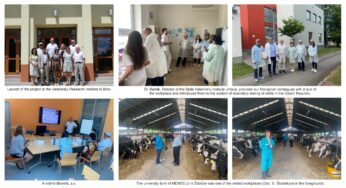The Veterinary Research Institute is currently implementing a project focused on international collaboration, with the aim of assisting Mongolian veterinarians. This project is financially supported by the Ministry of Industry and Trade of the Czech Republic in collaboration with the Embassy of the Czech Republic in Mongolia.
Mongolian livestock frequently suffer from poor health and the transmission of diseases is common. The underlying causes for this situation include limited access to veterinary services, inadequate treatment of sick animals and poor hygienic conditions. The combination of rapid urbanization and climate change are exacerbating the pressure put on animal health in Central Asia, says Doc. Radko Rajmon from the State Veterinary Administration.
“The project focuses on creating the conditions for the situation improvement by providing education and training to Mongolian veterinary professionals. Based on the acquired knowledge, recommendations, know-how, and insights gained in a selected veterinary station in the Czech Republic, the Mongolian party will construct the first model veterinary station in Mongolia and put it into operation,” says Dr. Jan Bernardy, the expert guarantor of the project.
An important aspect will be, for example, the evidence of individual farm animals, including their marking, which has been disregarded until recently… – adds Doc. Soňa Šlosárková, an expert in cattle farming.
Dr. Csölle Putzová from the Centre for Technology Transfer and Project Support informs: “During a week of intensive collaboration, participants will have the opportunity to attend lectures delivered by top Czech experts in the field of livestock health and farming. They will also have a tour of farms, herds, state organisations, as well as pharmaceutical companies and technology manufacturers specialized in provision of equipment for veterinary stations and breeding facilities.
Furthermore, the visits include tours of certain Czech companies in the field, e.g. Bioveta, a.s., LabMediaServis, s.r.o. in Jaroměř, and V. RACEK, zemědělské technologie s.r.o., specialized in agricultural technologies.” —————————————————————————————————————————
Agricultural production accounts for 16.5% of Mongolia’s GDP and employs 27.7% of the working-age population. The sector is responsible for managing 60 million head of livestock, which, in addition to cattle and horses, includes significant numbers of sheep, goats, and camels cared for by approximately 120,000 herding families. Livestock keeping and the associated dairy and meat industry generate 70% of the sector’s output. Currently, the Mongolian government faces big challenges in ensuring the country’s food security. The main problem regarding food security Mongolia faces is food affordability due to disruptions in the global supply chain and the war in Ukraine. Given Mongolia’s geographical facts and climatic conditions, the task of increasing the domestic food production is difficult to fulfil, but essential. Poor animal health and the transmission of diseases are common among the livestock in Mongolia because of the lack of access to veterinary services, inappropriate treatment of sick animals and poor hygienic conditions. Animals affected by non-infectious diseases require extensive care and long-term treatment, diverting herders from their regular tasks and resulting in economic losses to them. The low qualifications of veterinarians and limited awareness of herders regarding proper procedures for treatment of injured or sick animals lead to the frequent and unnecessary use of various inappropriate drugs and therapeutic products. The lack of awareness, knowledge, and skills of local veterinarians, particularly the younger ones who have limited opportunities to acquire necessary expertise from their older counterparts, are the reasons for these unprofessional practices. At the same time, there is an absence of a veterinary centre dedicated to the treatment of animals with non-infectious diseases, limited training opportunities for veterinarians and facilities for further research, etc. The Mongolian party expressed their keenness to address the situation and they look forward to receiving assistance from Czech experts, knowledge, experience and know-how transfer in order to establish the first veterinary care centre (the first model veterinary station) in Mongolia.
—————————————————————————————————————————
The primary goal of the project is to enhance the expertise of Mongolian veterinarians and facilitate the adoption of new technologies by training courses, consultations, workshops, etc. The project is also anticipated to generate additional employment opportunities, enhance herders’ knowledge and skills in livestock care and health, mitigate livestock mortality associated with non-infectious diseases, and increase farm productivity, says Dr. Arnost Marks, an expert on Mongolian herding and economics.
Mr. Bolor-Erdene Bataar, one of the trainees, told us: “We are happy to have the opportunity to participate in this project and we thank the project implementers and financial support providers. We aspire to contribute to expediting the transition from the traditional nomadic approach to animal farming, which will facilitate animal breeding and veterinary care practices. We are making efforts to comprehend your approach to herd health control in order to enhance our ability to prevent the transmission of diseases such as brucellosis in Mongolia and, since 2008, also the local transmission of foot-and-mouth disease. Furthermore, we are seeking political support for this initiative as it should be connected with the objective of improving the quality of food produced for the people in our country.”
As part of the continuation of the programme’s ongoing activities, the participants will have the opportunity to visit the Institute of Animal Science, Research Institute of Agricultural Engineering, and the State Veterinary Administration in Prague.
Photodocumentation:



